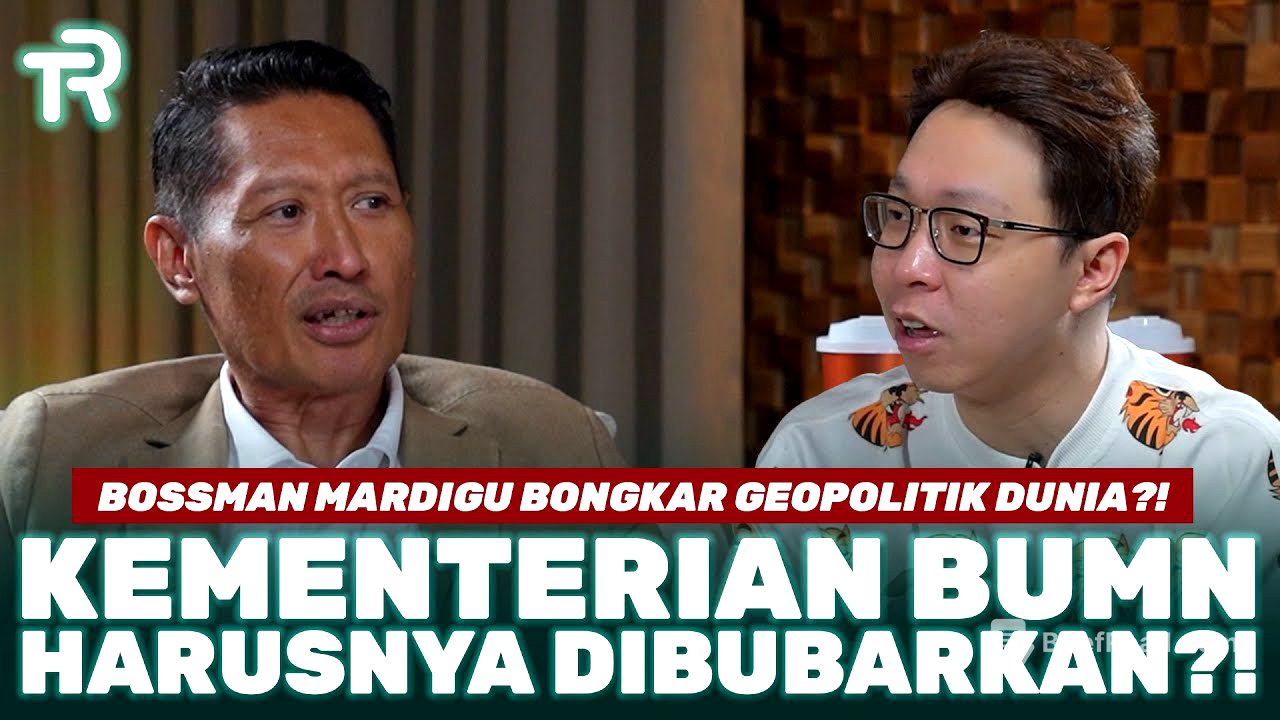TLDR;
This YouTube video features a discussion on Indonesian geopolitics, economic strategies, and the influence of social media. It covers Sri Mulyani's geopolitical decisions, the ideal economic approach for Indonesia, and the need for brave leadership. The conversation also explores global economic shifts, the importance of education, and the manipulation of social media.
- Sri Mulyani's appointment was a geopolitical decision influenced by the IMF and World Bank.
- The ideal economic strategy involves balancing fiscal and monetary policies.
- Indonesia needs brave leaders and a focus on STEM education to capitalize on its demographic bonus.
- Social media is a double-edged sword that can be used for propaganda and manipulation.
Geopolitical Decisions and Economic Strategies [0:00]
Sri Mulyani's appointment as Minister of Finance was a geopolitical decision made by previous presidents due to her familiarity with the IMF and World Bank. This decision prioritized social factors and the economy was handled through these international institutions. Geopolitics involves activities abroad, while politics refers to domestic activities.
Global Economic Shifts and Authoritarian Leadership [1:14]
The world is currently experiencing a geopolitical situation similar to that of 1900, with authoritarian leaders and nationalistic agendas. This has led to trade wars and economic tensions, starting with President Trump's tariffs on Chinese goods in 2017. Historically, trade and economic wars often lead to military conflicts.
The Rise of China and a Bipolar World [6:20]
In the past, the world was unipolar, dominated by America. However, with the rise of China and Russia, the world has become bipolar. America started to feel threatened by China's economic growth, leading to a pivot towards Asia. Managing the economy during times of war requires different strategies than during times of peace, and it was suggested that a man should be the leader to understand war better.
Economic Challenges and the Need for Change [10:07]
Indonesia's economy has been slow, partly due to delayed action and a focus on the wrong sectors. The manufacturing industry should be prioritized. The current Minister of Finance's approach of tight money policies is contrasted with the need for easy money to stimulate the economy. Purbaya's recent actions of releasing 200 trillion Rupiah are seen as a positive step towards providing stimulus.
Stimulating the Economy Through Banking [14:19]
The 200 trillion Rupiah stimulus is being channeled through banks to provide loans to entrepreneurs, which is expected to have a multiplying effect on the economy. This approach is considered more effective than social assistance. The goal is to support projects with added value, particularly those focused on export.
Indonesia's Economic Potential and Entrepreneurship [18:32]
While 200 trillion Rupiah is a good start, 2,000 trillion Rupiah would be ideal to make Indonesia the strongest southern country. Indonesia's advantage lies in its natural resources, which should be downstreamed rather than exported. The challenge is to increase entrepreneurship, which is currently low in Indonesia.
The Role of State-Owned Enterprises (BUMN) [21:07]
The state should not be involved in business unless it relates to natural resources. The Ministry of State-Owned Enterprises should be disbanded, and the state should focus on being a regulator rather than an operator. Danantara is already managing state-owned enterprises, making the ministry redundant.
Sovereign Wealth Funds and Economic Strategies [24:33]
The discussion touches on sovereign wealth funds and how countries like Saudi Arabia are pivoting from oil to dollars by converting their assets into property and services. China's economic growth was fueled by printing money and building infrastructure. Indonesia should imitate this approach and focus on national ownership.
Global Economic Decline and the Rise of Vietnam and India [42:16]
Many countries are experiencing economic decline due to individual egos and protectionist policies. However, Vietnam and India are exceptions, as they are imitating America's economic strategies from its heyday. Western media often presents a biased view of countries like Indonesia, aiming to undermine their potential.
Indonesia's Economic Ranking and Demographic Bonus [47:10]
Indonesia is part of the G20, but its economic ranking has slightly declined. India, on the other hand, has significantly improved its ranking. Indonesia needs to capitalize on its demographic bonus by developing a skilled workforce, particularly in STEM fields. This requires investing in education and importing lecturers if necessary.
Education and Curriculum Reform [56:48]
While free education is important, quality is crucial. The curriculum needs to be reformed to match market needs and focus on skills like social media. State-owned enterprises should set high standards for employees, such as TOEFL scores, to drive quality in education.
Social Media Manipulation and Propaganda [1:02:56]
Social media is a double-edged sword that can be used for communication, propaganda, and manipulation. Agitation, provocation, and propaganda are used to change mindsets. AI is increasingly being used to manipulate opinions and spread misinformation. The State Intelligence Agency needs to counter this with counter-intelligence propaganda.









